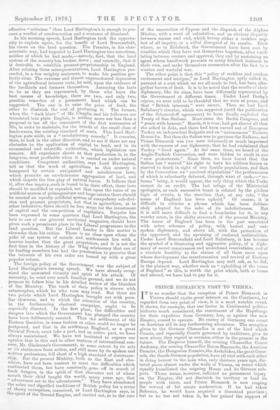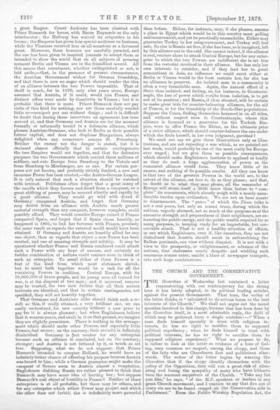PRINCE BISMARCK'S VISIT TO VIENNA.
IT is no wonder that the reception of Prince Bismarck in Vienna should excite great interest on the Continent, for regarded from any point of view, it is a most notable event. It shows, for example, that one factor in Continental politics hitherto much considered, the resentment of the Hapsburgs for their expulsion from Germany, has, as against the new Empire, ceased to operate. No enemy of Germany can count on Austrian aid in any forthcoming adventure. The reception given to the German Chancellor is not of the kind which Courts, and especially Courts governed by traditions, give to men whom they regard as enemies, either in the present or the future. The Emperor himself, the retiring Chancellor Count Andrassy, the coming Chancellor Baron Haymerle, the Austrian Premier, the Hungarian Premier, the Archdukes, the great Gene- rals, the South-German population, have all vied with each other in doing honour to the man who, only thirteen years ago, dic- tated peace almost under the walls of Vienna, on terms which equally humiliated the reigning House and its German sub- jects. Those terms, however, inflicted no permanent injury on the Empire, did not diminish its territory or load its people with taxes, and Prince Bismarck is now reaping the reward of his astute moderation. If he had taken Bohemia, he would have acquired a disconted province ; but as ho has not taken it, he has gained the support of
a great Empire. Count Andrassy has been closeted with Prince Bismarck for hours, with Baron Haymerle as the only interlocutor ; the Hofburg has waived its etiquettee in his favour; the Emperor has given him special audience on business, while the Viennese received him on all occasions as a favoured guest. Moreover, these honours are carefully paraded, and the cue has been given to inspired journals to accept them as intended to show the world that on all subjects of pressing moment Berlin and Vienna are in the friendliest accord. All this means that resentment, whether extinguished or not, is laid aside,—that, in the presence of present circumstances, the Austrian Government wishes for German friendship, and that there is now no anger which should render the idea of an alliance between the two Powers impossible. That of itself is much, for in 1870, only nine years since, Europe assumed that Austria, if it could, would join France, and distinct offers were made by Gambetta to Vienna ; but it is probable that there is more. Prince Bismarck does not pay visits of this kind for nothing, nor are those carefully worded little communique's put out without design ; and it is difficult to doubt that during these interviews an agreement has been arrived at, and that Germany and Austria are for the moment formally or informally bound in a defensive alliance, which pleases Austrian-Germans, who look to Berlin as their possible future capital, and does not displease Hungarians, always delighted when any occurrence annoys St. Petersburg. Neither the enemy nor the danger is stated, but it is declared almost officially that in certain contingencies the two Empires would act together, and that for defensive purposes the two Governments which control three millions of soldiers, and rule Europe from Strasburg to the Vistula and from Hamburg to Montenegro, are as one. For certain pur- poses not yet known, and probably strictly limited, a new and immense Power has been created,—the Austro-German League. It is only natural that such a situation should be watched with interest. Politicians often forget that a great many of the results which they foresee and dread from a conquest, or a great shifting of power, may be secured silently and rapidly by a great alliance. They would go wild with dread if Germany conquered Austria, and forget that Germany may derive from an alliance with Austria much greater material strength than any conquest, however complete, could possibly afford. They would consider Europe ruined if France conquered Spain, and forget that if Spain chose heartily, as happened in 1805, to link her fortunes with France, precisely the same result as regards the external world would have been attained. If Germany and Austria are heartily allied for any one object, then as regards that object a new Power has been created, and one of amazing strength and solidity. It may be questioned whether France and Russia combined could attack such a Power with any hope of success, and certainly no feebler combination of nations could venture even to think of such an enterprise. To assail either of these Powers is a feat of the kind from which most statesmen shrink, but to assail both together would be a task for all the remaining Powers in coalition. Central Europe, with its 70,000,000 of brave people, and its young men all trained for war, is at the disposal of two men; and if universal rumour may be trusted, the two men declare that all their serious interests are identical, and that in certain contingencies, not specified, they will act heartily together. That Germans and Austrians alike should think such a re- sult as this, if really attained, a very brilliant one, we can easily understand, for new security without a new price to pay for it is always pleasant ; but when Englishmen believe that it ensures peace, and exult in it on that ground, we imagine they are slightly premature. There is nothing in the arrange- ment which should make other Powers, and especially little Powers, feel secure ; on the contrary, their security is definitely diminished. Germany is (not weaker for any enterprise because such an alliance is concluded, but on the contrary, stronger ; and Austria is not fettered by it, so much as set free. Supposing, what we do not suppose, that Prince Bismarck intended to conquer Holland, he would have an infinitely better chance of effecting his purpose because Austria was bound to him; while a German guarantee might make the conquest of Greece seem to Austria almost a temptation. Englishmen disliking Russia are rather pleased to think that Bismarck may have some idea of hurting her ; but suppose
13ismarck's real object of hostility is France ? Neither of these enterprises is at, all probable, but there may be others, and for any enterprise which either Power may project and which the other does not forbid, she is indefinitely more powerful
than before. Either, for instance, may, if she pleases, assume a place in Egypt which would be to this country most galling and inconvenient, and yet be practically unassailable. Either may guarantee Turkey in her misgovernment, and Turkey will feel safe. So also is Russia set free, if she has been, as is imagined, left by this alliance out in the cold. She cannot indeed, if the alliance is real, venture alone to attack Central Europe, but for any enter- prise to which the two Powers are indifferent she is set free from the restraint involved in their alliance. She has only her own interests to consider, and if they lead her to great annexations in Asia, no influence we could exert either at Berlin or Vienna would in the least restrain her, for she has no alliances to preserve. An isolated man in a community is often a very formidable man. Again, the natural effort of a State thus isolated, and feeling, as, for instance, in Constanti- nople, the loss of power which results from isolation, is to get out of its position ; and Russia, if thus situated, will be certain to make great bids for counter-balancing alliances, for the aid of France, or for the friendship of the South-Slav populations. Suppose the Czars, finding themselves hemmed in on all sides, and without respect even in Constantinople, where this alliance is hymned as a guarantee for the Turkish Em- pire, were to offer France the Rhine, as the ultimate price of a strict alliance, which should counter-balance the one under which she finds herself, in her own judgment, garotted ? We need not say we give these illustrations only as illus- trations, and are not expecting a war which, as we pointed out last week, would probably be one of the most costly for Europe ever waged ; but we give them as possible consequences, which should make Englishmen hesitate to applaud as loudly as they do such a huge agglomeration of power as the rumoured alliance would form. They know little of its causes, and nothing of its possible results. All they can know is that two of the greatest Powers in the world are, to the extent of the alliance, set free to do as they please; and that, in doubt as to what they may please, all the remainder of Europe will strain itself a little more than before to " com- plete " its armaments, which already weigh with a nearly unen- durable burden upon civilisation. We are not an hour nearer to disarmament. The " peace " of which the Times talks is not a real peace, but only an DA med truce, during which the nations, vaguely alarmed, not so much at the purposes as at the excessive strength and preparedness of their neighbours, are ex- hausting the public energy, and the public wealth required for so many purposes, in keeping ready for an improbable, but con- ceivable attack. That is not a healthy situation of affairs, or one which Englishmen, even if, like ourselves, they are not disinclined that Austria should assist in enfranchising the Balkan peninsula, can view without disquiet. It is not with a view to the prosperity, or enlightenment, or advance of the nations, that statesmen nearly despotic and wielding such enormous armies enter, amidst a blare of newspaper trumpets, into such huge combinations.



































 Previous page
Previous page